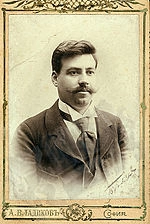How to Pronounce Gotse Delchev
#50
Most Popular
Boost
Feb 04, 1872 Kilkis, Decentralized Administration of Macedonia and Thrace, Greece Died on 04 May 1903 (aged 31)
Bulgarian revolutionary
AquariusGotse Delchev, Date of Birth, Place of Birth, Family, Facts, Age, Net Worth, Biography and More in FamedBorn.com

Bulgarian revolutionary
Aquarius